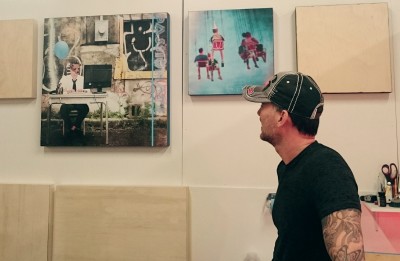STORY BY CHANELLE FAGON-TURNER

Do artists really need art school?
This Saturday is Portfolio Review Day at Sheridan’s Trafalgar campus and many aspiring artists are getting their portfolios ready for criticism.
Some artists can be self-taught and rely on their motivation and skills to achieve success, while others pursued post-secondary programs taught by trained professionals.
Some experienced artists didn’t see self-teaching as an option, like Bachelor of Illustration graduate David Razi.
“I didn’t really know there was another option. These days you go to art school, get job and work. You think of self taught as Da Vinci,” said Razi.
“Some people can never be self taught no matter how hard they try. Some of the best artists I know taught themselves, but they have superhuman drive.”
Razi is currently a graphic designer, technical illustrator and comic artist on his Youtube channel called Technical Dave, popular amongst Sheridan art students, where he uses comics to relive his time at Sheridan College.
Morgan Jones, self taught mixed media photographer and former director of sales at Brother Canada, didn’t see art school as an option when he was younger.
“I didn’t go to art school cause when I went to university I thought I’d never be a full time artist. I was naive. I was 20,” said Jones.
A graduate of Carleton University, Jones made a drastic career change in 2013 when he left his position of Director of Sales and started pursing his real passion full-time.
“Not many people use the degree they go to school for, but you develop certain connections and skill sets that will last you a lifetime,” said Jones.
Sol Friedman, award winning writer, director and animator from Toronto, went to school for printmaking, but all the film making and animation was self taught.
He’s has noticed differences between self taught and trained film directors in his industry.
“The people that I know who went to film school, have the benefit of friends from film school, who they can convince to help them when they are shooting something independently. I don’t have those contacts and resources, which in itself might have been worth the tuition.”
Angela Iarocci, York University/Sheridan College Bachelor of Design coordinator and professor,
noted that all artists, educated and uneducated, need discipline and drive.
“Education in any context requires self-motivation. Students within art/design programs will always need to seek out new knowledge and experiences that support and complement what they are exposed to within curriculum.”
However, she’s seen how degree programs can give an artist special benefits and impress employers.
“It depends on the position and the requirements of the job. In most cases junior design positions will require a bachelor degree, but the quality of the portfolio is what will distinguish one applicant from another.”
Kianja Takera, Policy Management student at Carleton University and self-taught fashion designer, acknowledges that she could still learn more with a formal education in fashion design.
“Sometimes I feel like I have a million ideas, but not the knowledge to execute them,” said Takera.
“Being self-taught is a journey of making a lot of mistakes in order to learn. I could skip some of those mistakes with a teacher.”
Razi also said self taught artists missing out on important feedback.
“They may be doing something horribly wrong, but never know because of no professional training.”
Many of the artists had valuable advice for new artists and students.
“Ask lots of questions. You got to be bold. Decide what you want out of your art,” said Jones.
Razi advised first year students to take advantage of their time and take their work seriously.
“Say yes to everything art related. Go to extra life drawing classes. Draw everyday. Draw anything. Don’t skip a single day,” said Razi. He also said not to work for free.
“Family discounts aren’t a thing. Art is work. You need to respect yourself as an artist. You need to learn to say no.”